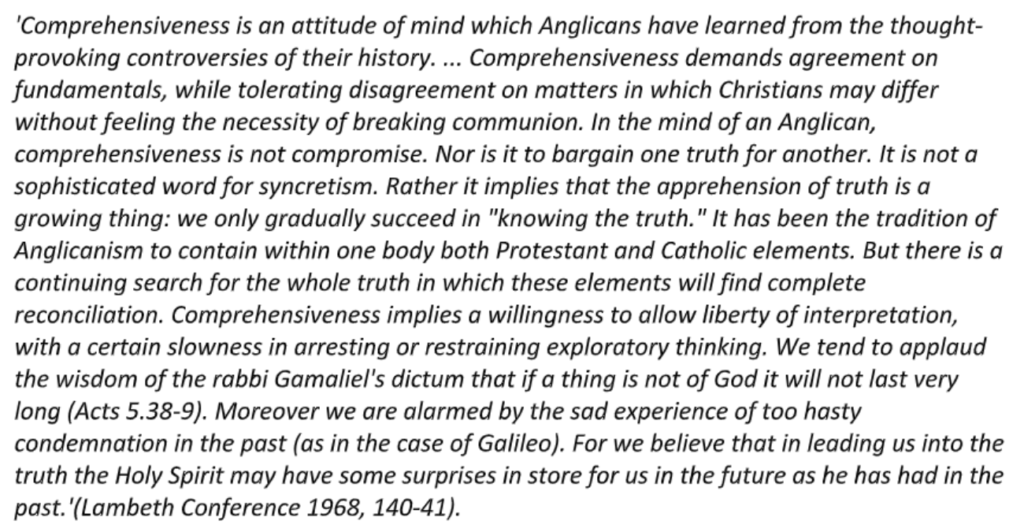To save you the bother (and the trauma) of reading “that” other blog we are re-posting that blog’s “General Synod wrap-up” and in the spirit of Christopher Pyne, we’ve fixed it. See! There are some things we can agree on after all.
GENERAL SYNOD WRAP-UP – THE ANGLICANS WHO DON’T WANT TO BE ANGLICAN?
MAY 14, 2022 / COMPREHENSIVIST / ANGLICAN COMMUNION, BLOG, FEATURED / 0 COMMENTS
Friday saw day 5 of General Synod as we wrapped things up and then made our way to the airport and began the long trip home to our various dioceses.
I’m sure each of us will have had our own thoughts as the plane lifted into the early evening sky. Is it too melodramatic to suggest that as a beautiful sunset washed across the horizon we had also witnessed the the first shafts of a new light burning within the heart of the Anglican Church of Australia?
I live in hope.
But one burning question would not leave me as I reflected on all that had happened during our week on the Gold Coast:
Why did some Anglicans not want to be Anglican?
One debate on the last morning crystallised much of what we had experienced over the week. Bishop Matt Brain of Bendigo moved, with Professor Dorothy Lee seconding, a motion titled “Being the Body of Christ”.

The intent of the motion was pretty clear, as Bp Brain explained in his speech telling us it invited Synod to say, “I count you in before I count you out”. Rising in support, Professor Lee told us “we have a huge amount of things in common” going onto set the figure at “at least 95%”.
So, in essence, we were being asked to affirm a proposition that, as The Anglican Church of Australia, despite our acknowledged differences, there was much (at least 95%) that we agreed upon and so we ought to work hard at unity despite those (5%) differences. It was a motion that drew on the centuries old central character of Anglicanism, that of comprehensiveness.

Generosity as expressed in Bp Brain’s motion has been part of Anglican DNA from our beginnings.
And then someone did something crazy. As if they had heard nothing that Bp Brain or Professor Lee had to say they suggested we reframe an intentionally expansive motion and narrow it down. The following amendment was put up:

Thankfully people rose to speak against the amendment as “restrictive” and even “divisive”.
So consider for a moment what is happening here. We are presented with a call to unity since “we have a huge amount of things in common” and an amendment seeking to restrict what that might mean and to divide us is put up. You can’t get more comprehensive than suggesting that we might, “discover each other’s faith as it is today and to appeal to history only for enlightenment, not as a way of perpetuating past controversy’”.
So could Synod gladly agree to agree upon and unite around what our comprehensive identity as the Anglican Church of Australia?
The amendment was narrowly passed, 119 for and 113 against demonstrating once again that comprehensiveness is a character valued by the majority of the Synod.
Immediately Assoc. Prof. Anstey rose to ask that “we move to the previous question”. This is a technical motion that essentially asks Synod to not progress any further on a motion. Also expressed as “move that the question not be put”. Faced with a motion that we narrow the terms of what it might mean to live together charitably, synod decided not to continue to talk about it. Anstey’s motion was passed on the voices.
And so here we see the real (dare we say the Fundamental) issue that the Anglican Church of Australia is facing. Those committed to a comprehensive vision of the church insist that they want unity. They tell us that we hold so much in common. Yet almost every time this synod was asked to affirm the richness of our diversity, let alone rejoice in it, the conservative wing would protest.
They didn’t want to accept the clear ruling of the Appellate tribunal with regard the Canon Concerning Services and instead wanted to narrow and restrict that ruling.
They wanted to narrow and restrict the meaning of chastity as set out in Faithfulness in Service.
Their Bishops pursued a statement on marriage that would have had no affect other than to hurt those already hurt by their refusal to have a more generous understanding of these things.
And finally there were those who audibly voted “No” to a motion celebrating 30 years of the ordination of women to the priesthood in Australia.
Anglicans who don’t want to be Anglican.
That’s really the problem with the Anglican Church of Australia. There are many, even some bishops, who don’t actually want to be Anglican. Rather than comprehensiveness they seek a narrow, even Calvinistic, confessional church, and that is not what Anglicanism has ever been about and that is not a church of which I can be a part.
